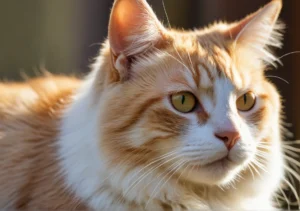Cats always seem to be on high alert, with their ears perked up and their eyes scanning their surroundings. Have you ever wondered why they are constantly in this state of readiness? Let’s dive into the reasons behind why cats are always on alert.
Natural Instincts
Have you ever noticed how your feline friend always seems to be on high alert, ears pricked and eyes wide? This behavior is not just random; it’s deeply ingrained in their DNA. Cats have a long history of being both predators and prey, which has shaped their instincts to stay constantly vigilant.
In the wild, cats rely on their keen senses to detect potential threats and opportunities for hunting. Their sharp eyesight, acute hearing, and sensitive whiskers allow them to be aware of even the slightest movements around them. This heightened awareness is a survival mechanism that has been passed down through generations, ensuring that cats are always ready to defend themselves or pounce on their next meal.
Additionally, cats are solitary hunters by nature, unlike pack animals like dogs. This means that cats are solely responsible for their own safety and sustenance. As a result, they must always be mindful of their surroundings to avoid danger and secure their next meal. This constant state of alertness helps cats navigate their environment with precision and agility, traits that have been key to their survival in the wild.
Hunting and Survival Skills
When your cat perks up at the sound of a rustling leaf or stares intently at a passing bird, it’s all part of their innate hunting instinct. Cats are natural-born hunters, with a predatory drive that compels them to stalk, pounce, and catch prey. This hunting behavior is not just for play; it’s essential for their survival.
In the wild, cats rely on their hunting skills to catch food and sustain themselves. This need for sustenance has shaped cats to be constantly on alert, scanning their environment for potential prey. Even domesticated cats retain this instinct, which is why they are always ready to spring into action at the slightest movement.
So, the next time your cat freezes in place, eyes fixed on a distant point, remember that it’s not just a random behavior. It’s a reflection of their deep-rooted hunting and survival instincts, honed over centuries of evolution. By staying alert and aware of their surroundings, cats are better equipped to navigate their environment and ensure their own well-being.
Sensory Abilities
Cats have superpowers hiding in their adorable furry bodies. Their sensory abilities are off the charts, making them the ultimate alert machines. Picture this: they can hear the faintest sounds, like a mouse tiptoeing miles away. Their night vision? It’s like having built-in night vision goggles, giving them an upper hand in the darkness. But wait, there’s more! Their whiskers are like tiny radars, sensing even the slightest movement in the air. So when Mr. Whiskers is on high alert, it’s not paranoia – it’s just their incredible senses at work!
Unique Insight:
Bonus tip: Did you know that a cat’s sense of smell is also top-notch? Their noses are like sniffing wizards, picking up scents that we couldn’t even imagine. This heightened sense of smell adds another layer to their alertness, making them experts in detecting any changes in their environment.
Threat Perception
Ever wonder why your cat jumps at the slightest noise? It’s all about threat perception. Cats have a built-in radar system that analyzes every corner of their surroundings for potential dangers. Whether it’s a sneaky bug crawling or a mysterious sound in the dark, they’re always on guard. Their survival instincts kick in, telling them to be ready for anything that comes their way. So next time your cat perks up out of nowhere, just know they’re not overreacting – they’re just staying one step ahead of any potential threats.
Additional Insight:
To cats, every move is a potential threat. Their innate survival instincts tell them to be on high alert at all times, ready to pounce into action. This constant vigilance helps them stay safe in their environment, making them the ultimate masters of self-preservation.
Social Hierarchy
Cats are always on alert partly due to their place in the social hierarchy. In the wild, cats have to compete for resources like food and shelter, so being constantly vigilant helps them survive. This instinct remains strong even in domestic settings. Indoor cats may not have to fight for their dinner, but they still have a natural need to establish their territory and defend it if necessary. Knowing where they stand in relation to other animals, including other cats in the household, keeps them on their toes. So, if your kitty seems ready to pounce at any moment, it might just be their way of staying on top of their social game.
Environmental Factors
The environment a cat lives in can greatly impact their level of alertness. Loud noises, sudden movements, or unfamiliar scents can all trigger a cat’s fight-or-flight response, keeping them in a constant state of alertness. For example, if you recently moved to a new place, your cat might be extra jumpy as they try to familiarize themselves with the new surroundings. Similarly, if there are frequent loud noises in your home, like construction work or thunderstorms, your cat might always be on edge. Creating a calm and predictable environment for your feline friend can help reduce their stress levels and promote a sense of security.
- Provide hiding spots: Cats feel safest when they have hiding spots to retreat to when they feel threatened or overwhelmed. Make sure your cat has access to cozy hideaways like cat trees, boxes, or covered beds.
- Maintain a routine: Cats thrive on routine, so try to stick to a consistent schedule for feeding, playtime, and rest. Predictability can help reduce your cat’s anxiety and keep them more relaxed.
- Interactive play: Keeping your cat mentally stimulated through interactive play sessions can help channel their energy and reduce their overall stress levels. Toys that mimic hunting behaviors, like feather wands or laser pointers, can be especially engaging.
Emotional State
When it comes to understanding why cats are always on alert, it’s essential to consider their emotional state. Cats can be highly sensitive animals, and their alertness can be influenced by various emotions such as stress, anxiety, or excitement.
Cats experiencing stress may exhibit heightened alertness as they try to assess their environment for potential threats. Similarly, anxious cats may remain on high alert, constantly scanning their surroundings for perceived dangers. On the other hand, cats feeling excited may also display increased vigilance, eagerly anticipating playtime or treats.
To help your cat feel more relaxed and less on edge, create a comfortable and secure environment for them. Provide plenty of hiding spots, vertical spaces to survey their surroundings, and interactive toys to keep them mentally stimulated. Regular play sessions and positive interactions can also help alleviate stress and reduce anxiety levels in your feline friend.
Health Considerations
Understanding why cats are always on alert can also involve considering their health. Heightened alertness in cats can sometimes be a sign of underlying health issues that require attention.
If your cat is constantly on edge and displaying increased vigilance, it may be worth consulting with a veterinarian to rule out any medical conditions. Health problems such as hyperthyroidism, pain, or sensory impairments can manifest as heightened alertness in cats. Keep an eye out for other symptoms such as changes in appetite, grooming habits, or litter box behavior.
Maintaining regular veterinary check-ups, providing a balanced diet, and engaging in preventive care can help ensure your cat’s overall well-being. By addressing any health concerns promptly, you can help your feline companion feel more secure and relaxed in their environment.
Additional Insights: Signs of hyperthyroidism in cats may include weight loss, increased appetite, restlessness, and excessive grooming. If you suspect your cat may have hyperthyroidism, seek veterinary care for proper diagnosis and treatment.
Bonding and Trust
Does it seem like your cat is always on high alert? Building a strong bond with your furry friend could be the key to helping them feel more relaxed and secure. By spending quality time with your cat, playing games, and offering gentle petting, you can create a sense of trust and security that may reduce their need to be constantly on guard. Cats are sensitive creatures that thrive on routine and familiarity, so establishing a consistent and loving relationship with your pet can help them feel more at ease in their environment.
Fun Facts
Did you know that cats have a highly developed sense of hearing, which allows them to detect even the slightest sounds? This keen sense of hearing is a survival instinct that dates back to their wild ancestors, who relied on their sharp senses to detect potential threats. Additionally, cats have a unique ability to rotate their ears a full 180 degrees, allowing them to pinpoint the source of a sound with incredible accuracy. So next time you see your cat’s ears swivel towards a noise, remember that they are just tapping into their innate instincts to stay alert and safe. – Cats have a third eyelid called the nictitating membrane, which helps protect their eyes and keep them sharp in case of any sudden movements. – A cat’s whiskers are highly sensitive and can help them navigate their surroundings in the dark, acting as a built-in radar system to detect obstacles and predators. – Contrary to popular belief, cats are not nocturnal but crepuscular, meaning they are most active during dawn and dusk when their prey is most active. So, next time your cat zooms around at odd hours, remember they are just following their natural hunting instincts.
Alex, a passionate animal lover, has experience in training and understanding animal behavior. As a proud pet parent to two dogs and three cats, he founded AnimalReport.net to share insights from animal experts and expand his knowledge of the animal kingdom.




